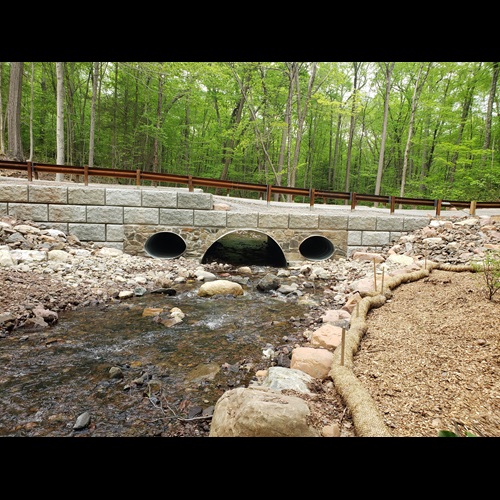Forest Management on State Lands

There are 33 State Forests totaling about 175,000 acres in Connecticut. They are managed by the Department of Energy and Environmental Protection, Division of Forestry. The Division of Forestry seeks to develop a vigorous, resilient, forest environment capable of sustaining the wide range of demands that the public places on these lands. These demands include a variety of recreational experiences, natural diversity (including threatened and endangered species), the preservation of unique sites (both geologic and archaeological), the provision of raw materials as forest products, and the maintenance of wildlife and fisheries habitats. The Division’s professional foresters work to ensure that these forests remain healthy and vigorous while serving the needs of the citizens of Connecticut.
Connecticut’s woodlands offer many benefits and ecosystem services such as:
- Forest Ecosystem Health and Diversity – Healthy and diverse forest ecosystems provide highly functional, valuable, and a resilient mix of habitats for plants and animals.
- Wildlife Habitat – Many of Connecticut’s wildlife species, both common and rare, use different kinds of forested habitats. It is important to create a variety of habitats for animals that have different needs.
- Climate Change Mitigation through Sequestration and Storage – As climate change continues to be an important global issue, Connecticut’s State Forests can mitigate climate change by sequestering and storing carbon in vegetation above and below ground and as long-lived wood products used locally and beyond.
- Environmental Protection – Connecticut’s State Forests provide environmental benefits such as cleaning the air, protecting and improving water quality, and contributing to soil health.
- Forest Protection – Managing Connecticut’s State Forests helps reduce susceptibility to threats such as wildfire, weather events, and invasive plants and insects, keeping them healthy and productive while minimizing spread to neighboring private forestlands.
- Economic Benefits – Sustainably harvesting forest products like timber, firewood, witch-hazel, and maple syrup from Connecticut’s State Forests provides jobs and raw material for a locally-sourced, forest-based, green economy. The State Forests provide a model for private forest landowners to consider when managing their properties.
- Recreational/Health Benefits – Recreation opportunities abound across Connecticut’s State Forest system providing a local and economical way to stay healthy and active for Connecticut’s residents and guests.

Clearcut Treatment
Oak Shelterwood Establishment Harvest
White Pine Thinning
White Pine Plantation Thinning
Irregular Shelterwood Harvest
A Reminder to those Recreating in CT's State Forests:
The CT Blue-Blazed Trail System is for foot traffic only. Please respect CT Statute Sec. 23-10a and refrain from mountain bike and horse back riding. The portions of this trail system that cross State property are maintained by CT Forest and Park Association volunteers and are designated as hiking trails. Thank you for your cooperation.
State Forest Management Plans
- American Legion State Forest
- Camp Columbia State Forest and State Historic Park
- Centennial Watershed State Forest - Aspetuck-Hemlock Reservoir Block
- Centennial Watershed State Forest - Lakeville Reservoir Block
- Centennial Watershed State Forest - Means Brook Watershed Block
- Centennial Watershed State Forest - Wangum Lake Block
- Cockaponset State Forest
- Gold's Pines Natural Area Preserve
- James L. Goodwin State Forest
- Massacoe State Forest
- Mattatuck State Forest - Campville Block
- Mattatuck State Forest - Northfield Block
- Meshomasic State Forest - Diamond Lake Block
- Meshomasic State Forest - Mountain Block
- Mohegan State Forest
- Nassahegon State Forest
- Natchaug State Forest - Eastford, Bigelow Brook, Westford, and West Ashford Blocks
- Nathan Hale State Forest
- Naugatuck State Forest - Mount Sanford Block
- Naugatuck State Forest - Great Hill Block
- Nehantic State Forest
- Nipmuck State Forest - Breakneck Block
- Pachaug State Forest - Wickaboxet, Greenfalls, and Glasgo Blocks
- Pachaug State Forest - Wyassup Block
- Paugussett State Forest - Lower and Kazan Blocks
- Salmon River State Forest - Blackledge Block
- Salmon River State Forest - Day Pond Block
- Salmon River State Forest - Leesville Block and Wopowog WMA
- Salmon River State Forest - Gilead Block
- The Preserve State Forest
- Tunxis State Forest - Hartland Hollow Block
- Wyantenock State Forest - Woodville Block
Invitations to Bid*
*The Division of Forestry will only accept bids from individuals and entities on the registered Bidders List. The application for the Bidders List and additional information is available in the Bidders Manual For The Sale of Forest Products From State-Owned Lands.
State Forest Maps
State Forest Infrastructure Projects
Culvert Replacement on Brooksvale Stream, Naugatuck State Forest, Mt. Sanford Block, Hamden

Culvert on Brooksvale Stream prior to replacement, December 2021.

New culvert on Brooksvale Stream, May 2025.
This project was completed in May 2025. Brooksvale Stream provides ideal habitat for native brook trout because much of the watershed is made up of managed State Forests. Public access to this block of the forest from the end of Downes Road is via the white or blue trails and not through the YMCA Camp, which is private property.

Other Resources
Slab Wood for Firewood from the DEEP Sawmill
Habitat Management at Wildlife Management Areas and State Forests
Why We Manage Connecticut State Forests
Bidders Manual for the Sale of Forest Products from State-Owned Lands
Sustainable Yield on Timberland Managed by the Division of Forestry
Letterboxing in Connecticut State Forests
Bird Checklist for Naugatuck State Forest
100th Anniversary of Peoples State Forest Video
Content last updated January 2026.

